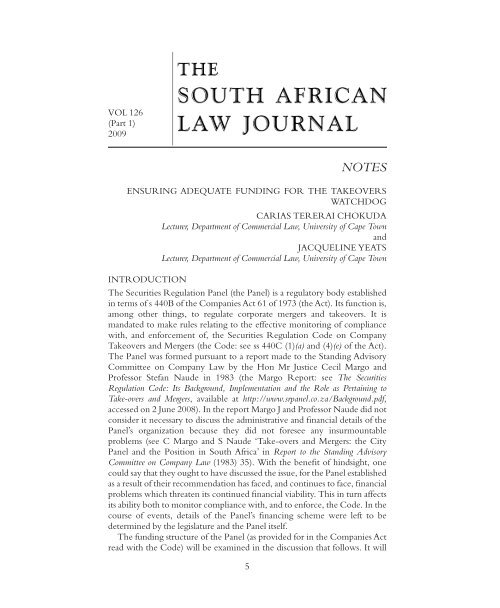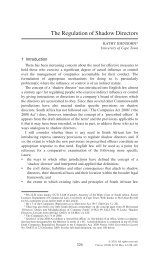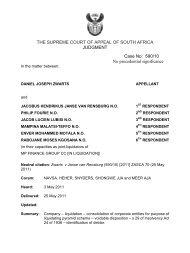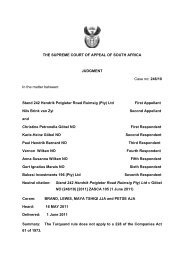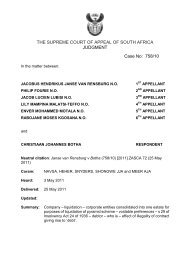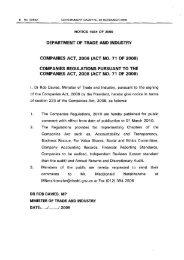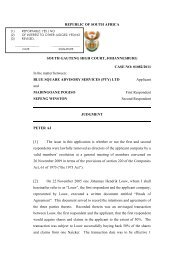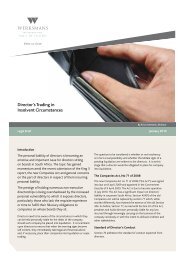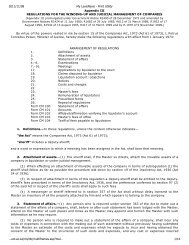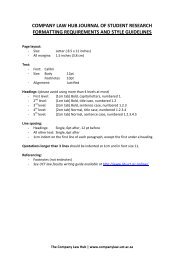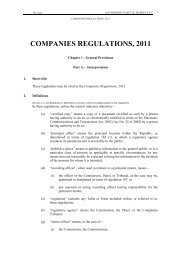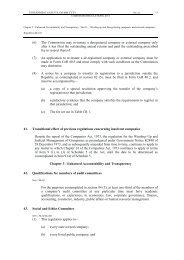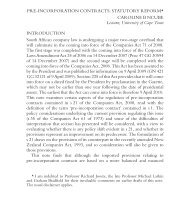SALJ 09 Part 1 - Company Law Hub - University of Cape Town
SALJ 09 Part 1 - Company Law Hub - University of Cape Town
SALJ 09 Part 1 - Company Law Hub - University of Cape Town
You also want an ePaper? Increase the reach of your titles
YUMPU automatically turns print PDFs into web optimized ePapers that Google loves.
VOL 126<br />
(<strong>Part</strong> 1)<br />
20<strong>09</strong><br />
NOTES<br />
ENSURING ADEQUATE FUNDING FOR THE TAKEOVERS<br />
WATCHDOG<br />
CARIAS TERERAI CHOKUDA<br />
Lecturer, Department <strong>of</strong> Commercial <strong>Law</strong>, <strong>University</strong> <strong>of</strong> <strong>Cape</strong> <strong>Town</strong><br />
and<br />
JACQUELINE YEATS<br />
Lecturer, Department <strong>of</strong> Commercial <strong>Law</strong>, <strong>University</strong> <strong>of</strong> <strong>Cape</strong> <strong>Town</strong><br />
INTRODUCTION<br />
The Securities Regulation Panel (the Panel) is a regulatory body established<br />
in terms <strong>of</strong> s 440B <strong>of</strong> the Companies Act 61 <strong>of</strong> 1973 (the Act). Its function is,<br />
among other things, to regulate corporate mergers and takeovers. It is<br />
mandated to make rules relating to the effective monitoring <strong>of</strong> compliance<br />
with, and enforcement <strong>of</strong>, the Securities Regulation Code on <strong>Company</strong><br />
Takeovers and Mergers (the Code: see ss 440C (1)(a) and (4)(e) <strong>of</strong> the Act).<br />
The Panel was formed pursuant to a report made to the Standing Advisory<br />
Committee on <strong>Company</strong> <strong>Law</strong> by the Hon Mr Justice Cecil Margo and<br />
Pr<strong>of</strong>essor Stefan Naude in 1983 (the Margo Report: see The Securities<br />
Regulation Code: Its Background, Implementation and the Role as Pertaining to<br />
Take-overs and Mergers, available at http://www.srpanel.co.za/Background.pdf,<br />
accessed on 2 June 2008). In the report Margo J and Pr<strong>of</strong>essor Naude did not<br />
consider it necessary to discuss the administrative and financial details <strong>of</strong> the<br />
Panel’s organization because they did not foresee any insurmountable<br />
problems (see C Margo and S Naude ‘Take-overs and Mergers: the City<br />
Panel and the Position in South Africa’ in Report to the Standing Advisory<br />
Committee on <strong>Company</strong> <strong>Law</strong> (1983) 35). With the benefit <strong>of</strong> hindsight, one<br />
could say that they ought to have discussed the issue, for the Panel established<br />
as a result <strong>of</strong> their recommendation has faced, and continues to face, financial<br />
problems which threaten its continued financial viability. This in turn affects<br />
its ability both to monitor compliance with, and to enforce, the Code. In the<br />
course <strong>of</strong> events, details <strong>of</strong> the Panel’s financing scheme were left to be<br />
determined by the legislature and the Panel itself.<br />
The funding structure <strong>of</strong> the Panel (as provided for in the Companies Act<br />
read with the Code) will be examined in the discussion that follows. It will<br />
5
6<br />
THE SOUTH AFRICAN LAW JOURNAL<br />
be shown that the funding structure has some weaknesses, which have<br />
resulted in inadequate funding for the Panel. In a bid to identify<br />
improvements that could be made to the Panel’s funding structure, a<br />
comparative analysis will be undertaken <strong>of</strong> the funding structures <strong>of</strong> similar<br />
regulatory bodies, namely the United Kingdom’s City Panel on Take-overs<br />
and Mergers (the London Panel), and the New Zealand Takeovers Panel.<br />
Similarities as well as significant differences exist between the funding<br />
structures <strong>of</strong> these two regulatory bodies and the Panel’s funding structure.<br />
On the basis <strong>of</strong> our comparative analysis, recommendations are made in this<br />
note as to how the Panel’s funding structure could be improved to ensure<br />
adequate funding, and which could enhance the Panel’s ability to enforce the<br />
Code.<br />
In making the recommendations referred to above, we have taken<br />
cognisance <strong>of</strong> the changes contemplated by the new South African<br />
Companies Act 71 <strong>of</strong> 2008 (date <strong>of</strong> commencement yet to be proclaimed at<br />
the time <strong>of</strong> writing), which seeks to reconstitute the Panel as the ‘Takeover<br />
Regulation Panel’, this as part <strong>of</strong> a wider, more far-reaching overhaul <strong>of</strong> the<br />
Companies Act as a whole. While we shall argue that the new Act introduces<br />
some new and positive features to the Panel’s funding structure, we shall<br />
indicate that the new Act also proposes to do away with some positive<br />
features <strong>of</strong> the existing Panel’s funding structure. We shall argue that<br />
significant changes to the current structure are not necessary, and that the<br />
current structure needs only to be improved upon.<br />
FUNDING OF THE PANEL<br />
Funding for the Panel is provided for in Rules 2.1 and 2.2 <strong>of</strong> the<br />
administrative rules in the Code, which are to be read with s 440C(4)(a) and<br />
s 440E <strong>of</strong> the Companies Act. Section 440C(4)(a) provides that the rules (as<br />
laid down in the Code) shall make provision for the administration and<br />
financing <strong>of</strong> the Panel. Section 440E further provides that all the fees payable<br />
under the rules contemplated in s 440(4)(a) shall be paid to the Panel and<br />
shall constitute its funds, and that the Panel shall utilize its funds for defraying<br />
expenses incurred in connection with the performance <strong>of</strong> its functions.<br />
According to rule 2.1 <strong>of</strong> the administrative rules in the Code, the Panel’s<br />
funding will be partially met from a fee, which is based on a percentage <strong>of</strong> the<br />
annual listing fees and initial listing fees charged by the Stock Exchange to<br />
companies listed on that exchange. The Stock Exchange in this case is the<br />
JSE Limited (the JSE). Rule 2.2 <strong>of</strong> the administrative rules provides for<br />
another source <strong>of</strong> funding, namely a fee charged in respect <strong>of</strong> the various<br />
services provided by the Panel. In terms <strong>of</strong> the Schedule <strong>of</strong> Fees and Charges<br />
which forms part <strong>of</strong> the administrative rules, these services include, among<br />
other services, consultations, interviews, advice and examination <strong>of</strong> documents.<br />
The Panel thus has two basic sources <strong>of</strong> funding: the levy based on a<br />
percentage <strong>of</strong> the annual listing fee or the initial listing fee charged by the JSE<br />
as provided for in rule 2.1; and the fee for services provided for in rule 2.2 <strong>of</strong><br />
the administrative rules.
NOTES 7<br />
It would appear that, as a source <strong>of</strong> income, the levy based on a percentage<br />
<strong>of</strong> the annual listing fees and initial listing fees charged by the JSE to<br />
companies listed on that exchange has a weakness in that it results in reduced<br />
revenues for the Panel when companies delist from the Stock Exchange and<br />
during periods when there are few or no initial public <strong>of</strong>ferings on the Stock<br />
Exchange. For example, in the Panel’s annual financial statement for the<br />
year ended 28 February 2003 (available at http://www.srpanel.co.za/AFS%<br />
202003.pdf, accessed on 2 June 2008), the Executive Director <strong>of</strong> the Panel<br />
noted that ‘[a] result <strong>of</strong> the shrinking number <strong>of</strong> companies maintaining their<br />
listing on the JSE . . . was that income received by way <strong>of</strong> the 4% levy<br />
charged on companies’ annual listing fees fell by 18% from R1 317 347 in the<br />
previous financial year to R1 076 322’. In order to compensate for the falling<br />
revenue received from this levy, the Panel has had to increase the rate <strong>of</strong> the<br />
levy (see Securities Regulation Panel Annual Financial Statements for the<br />
year ended 28 February 2005, available at http://www.srpanel.co.za/Annual%<br />
20Report%202005.pdf, accessed on 2 June 2008). The result <strong>of</strong> this increase<br />
in the levy, caused by the Panel’s need to break even, is that the reduced<br />
number <strong>of</strong> companies remaining on the Stock Exchange have to bear an<br />
increased burden to support the Panel.<br />
It is apparent that the funding available to the Panel under the existing<br />
funding structure is inadequate to meet the Panel’s operating needs. In 2004<br />
the Panel incurred a budget deficit <strong>of</strong> R1.53 million due to ‘falling revenues<br />
and hefty legal and enforcement costs’ (see Securities Regulation Panel<br />
Annual Financial Statements for the year ended 28 February 2004, available<br />
at http://www.srpanel.co.za/AFS%202004.pdf, accessed on 2 June 2008).<br />
Another deficit <strong>of</strong> R1.17 million in 2005 prompted the Panel’s Chairperson<br />
to say (in the Securities Regulation Panel Annual Financial Statements for<br />
the year ended 28 February 2005 loc cit):<br />
‘That is clearly an unsatisfactory position in which the Panel finds itself bearing<br />
in mind its importance to the South African economy and its financial markets.<br />
It also underlines . . .: —<br />
(i) the need for the Panel to be properly and adequately financed having<br />
regard inter alia to a statement made by one disputant that its pockets were<br />
far deeper than those <strong>of</strong> the Panel; . . .’<br />
It is clear from this that the Panel’s ability to enforce the Code against well<br />
funded corporations is undermined by inadequate funding. Despite this<br />
inadequate funding, the Panel has nevertheless managed to enforce the Code<br />
over the years, as Renée Bonochis observes (see ‘SRP Gives Minority<br />
Money’s Worth Despite Lame Budget’ in Business Report, available at<br />
http://www.busrep.co.za/index.php?fSectionId=553&fArticleId=2535857, accessed<br />
on 2 June 2008):<br />
‘In the absence <strong>of</strong> the necessary financial resources to match the enormously<br />
well-resourced vested interests that approach it on a daily basis, the SRP [Panel]<br />
has tended to resort to a variety <strong>of</strong> tactics, including informal discussions,<br />
persuasion and ex parte rulings. This is what has helped to keep the SRP<br />
[Panel]’s regulatory process ticking over.’
8<br />
THE SOUTH AFRICAN LAW JOURNAL<br />
However, it is submitted that inadequate funding threatens the Panel’s<br />
continued financial viability, and hence its ability to enforce the Code (S M<br />
Luiz ‘Enforcement <strong>of</strong> the Securities Regulation Code and the Role <strong>of</strong> the<br />
Courts’ (2006) 27 Obiter 49). Therefore, it is necessary to find ways <strong>of</strong><br />
ensuring adequate financing for the Panel. With this objective in mind a<br />
comparative analysis <strong>of</strong> the funding structure <strong>of</strong> the London Panel and the<br />
New Zealand Takeovers Panel will be undertaken below. The comparison<br />
between the Panel and the London Panel is appropriate given that the Code<br />
is to a large extent based on the City Code issued by the London Panel (see<br />
explanatory note 1(c) <strong>of</strong> The Securities Regulation Code on Take-Over and<br />
Mergers). On the other hand, a comparison with the Takeovers Panel in<br />
New Zealand is relevant given that the New Zealand Takeovers Panel is a<br />
statutory body like its South African counterpart (see s 5 <strong>of</strong> the New Zealand<br />
Takeovers Act 107 <strong>of</strong> 1993) and the New Zealand Takeovers Code that it<br />
enforces also has statutory force like the South African Code (see s 28(4) <strong>of</strong><br />
the New Zealand Takeovers Act). In addition, both the London Panel and<br />
the New Zealand Takeovers Panel operate in legal systems based on the<br />
common law, like the South African Panel does. The object <strong>of</strong> the<br />
comparative exercise is to identify areas where the Panel’s funding structure<br />
can be improved upon by learning from the experiences <strong>of</strong> similar regulatory<br />
bodies in these comparable jurisdictions.<br />
FUNDING OF THE LONDON PANEL<br />
Since its establishment in 1968, the London Panel, as well as the City Code<br />
which it administers, had no statutory backing (see R v Panel on Takeovers and<br />
Mergers, Ex <strong>Part</strong>e Datafin [1987] 1 QB 815 at 824). However, following the<br />
implementation <strong>of</strong> the European Union Directive on Takeover Bids in the<br />
United Kingdom in 2006, the London Panel was designated as the<br />
supervisory authority to carry out certain regulatory functions in relation to<br />
takeovers, and at the same time the City Code was accorded statutory force<br />
(see ss1 and 2(a) <strong>of</strong> the City Code on Takeovers and Mergers, available at<br />
http://www.thetakeoverpanel.org.uk/new/codesars/DATA/code.pdf, accessed on<br />
2 June 2008). The London Panel’s statutory functions are provided for in<br />
Chapter 1 <strong>of</strong> <strong>Part</strong> 28 <strong>of</strong> the United Kingdom’s Companies Act, 2006. (<strong>Part</strong><br />
28 <strong>of</strong> the Companies Act, 2006 came into force on 6 April 2007 as per the<br />
Companies Act, 2006 (Commencement No 2 Consequential Amendments,<br />
Transitional Provisions and Savings) Order 2007 published in SI 2007/1<strong>09</strong>3,<br />
available at http://www.opsi.gov.uk/si/si2007/uksi_20071<strong>09</strong>3_en.pdf, accessed on<br />
2 June 2008.) It should be noted that this Act does not confer the status <strong>of</strong> a<br />
statutory body on the London Panel. It remains an unincorporated body, as<br />
constituted from time to time, and as such has rights and obligations under<br />
the common law (see Explanatory note 1181 <strong>of</strong> United Kingdom Companies<br />
Act, 2006, available at http://www.opsi.gov.uk/acts/acts2006/en/06en46-<br />
u.htm#end, accessed 2 June 2008). Funding for the London Panel is provided<br />
for in ss 957–9 <strong>of</strong> the Companies Act, 2006. The London Panel derives its
NOTES 9<br />
funding from three sources <strong>of</strong> income, namely: document charges; the PTM<br />
(Panel on Takeovers and Mergers) levy; and exempt charges (see ‘Fees<br />
and Charges’, available at http://www.thetakeoverpanel.org.uk/new/, accessed<br />
on 2 June 2008).<br />
The funding from document charges is provided for in s 957 <strong>of</strong> the UK<br />
Companies Act, 2006 as read with s 13 <strong>of</strong> the City Code. Document charges<br />
are payable on <strong>of</strong>fer documents for all <strong>of</strong>fers valued at £1 million or more;<br />
the charge depends on the value <strong>of</strong> the <strong>of</strong>fer according to the scale <strong>of</strong><br />
document charges set out in the City Code (idem). Document charges are<br />
similar to the fees levied by the South African Panel for examining<br />
documents submitted to it for approval in terms <strong>of</strong> rule 2.2 <strong>of</strong> the<br />
administrative rules in the Code, as read with the Schedule <strong>of</strong> Fees and<br />
Charges. Thus on this count the Panel’s funding structure is similar to that <strong>of</strong><br />
the London Panel.<br />
The PTM levy is provided for in s 958 <strong>of</strong> the UK Companies Act, 2006.<br />
Section 958(1) provides:<br />
‘For the purpose <strong>of</strong> meeting any part <strong>of</strong> the expenses <strong>of</strong> the [London] Panel, the<br />
Secretary <strong>of</strong> State may by regulations provide for a levy payable to the Panel —<br />
(a) by specified persons or bodies, or persons or bodies <strong>of</strong> a specified<br />
description, or<br />
(b) on transactions, <strong>of</strong> a specified description, in securities on specified<br />
markets . . .’<br />
On the face <strong>of</strong> it, the PTM levy appears to be similar to the levy charged<br />
by the South African Panel, which is based on a percentage <strong>of</strong> the annual<br />
listing fee or the initial listing fee charged by the Stock Exchange as provided<br />
for in rule 2.1 <strong>of</strong> the administrative rules. However, the two levies are<br />
different. The difference is fundamental in so far as the revenue potential <strong>of</strong><br />
the two levies is concerned. As a source <strong>of</strong> revenue, the PTM levy has a<br />
much wider scope <strong>of</strong> application and hence a potentially larger revenue<br />
generation capability than the South African levy, which is payable by<br />
companies listed or listing on the Stock Exchange only. According to<br />
s 958(1) <strong>of</strong> the UK Companies Act, 2006 the PTM levy is payable by<br />
specified persons or bodies and it can also be levied on specified transactions<br />
in securities on specified markets. Currently, the PTM levy is applied to<br />
all UK securities transactions, except gilts, where the value <strong>of</strong> the deal<br />
exceeds £10 000 or h15 000 (see ‘What is PTM?’, available at http://<br />
www.firstdirect.com/investments/sharedealing-rates-fees.shtml#question5, accessed<br />
on 2 June 2008). It is thus a charge imposed on investors when they buy or<br />
sell shares the value <strong>of</strong> which exceeds £10000 (see PTM levy definition,<br />
available at http://www.finance-glossary.com/terms/PTM-levy.htm?id=2008<br />
&ginPtrCode=00000&PopupMode=, accessed on 2 June 2008). It is levied on<br />
transactions carried out on three securities markets: the London Stock<br />
Exchange; virt-x; and Ofex (see ‘Fees and Charges’ ibid).<br />
Section 958(2) <strong>of</strong> the UK Companies Act, 2006 further provides that the<br />
power to specify (or specify descriptions <strong>of</strong>) persons or bodies must be<br />
exercised in such a way that the PTM levy is payable only by persons or
10<br />
THE SOUTH AFRICAN LAW JOURNAL<br />
bodies that appear to the Secretary <strong>of</strong> State to be capable <strong>of</strong> being directly<br />
affected by the exercise <strong>of</strong> any <strong>of</strong> the functions <strong>of</strong> the Panel, or otherwise<br />
appear to have a substantial interest in the exercise <strong>of</strong> any <strong>of</strong> those functions.<br />
It will be seen from this that the PTM levy goes beyond the London Stock<br />
Exchange to cover unlisted entities and persons who are capable <strong>of</strong> being<br />
directly affected by the London Panel’s exercise <strong>of</strong> its functions or have a<br />
substantial interest in the exercise <strong>of</strong> those functions. Given its wider scope <strong>of</strong><br />
application, and the frequency and the volumes at which shares are bought<br />
and sold on the specified securities markets, the PTM levy has the potential<br />
to raise far more revenue than a levy based on the percentage <strong>of</strong> fees charged<br />
to companies listed or listing on the Stock Exchange.<br />
The exempt charges are provided for in s 13 <strong>of</strong> the City Code. They are<br />
levied on entities such as fund managers and principal traders who are<br />
granted exemption from the application <strong>of</strong> certain provisions <strong>of</strong> the City<br />
Code: for example, a fund manager may be exempted from the application<br />
<strong>of</strong> the principle <strong>of</strong> acting in concert. The granting and continued regulation<br />
<strong>of</strong> exempt status is provided at a cost to the Panel, and groups which benefit<br />
from exempt status are required to pay a charge <strong>of</strong> £5000 per exempt entity<br />
at the time <strong>of</strong> review (see ‘Fees and Charges’ ibid). There appears to be no<br />
equivalent <strong>of</strong> the exempt charges in the funding structure <strong>of</strong> the South<br />
African Panel. Although s 440L <strong>of</strong> the South African Companies Act makes<br />
reference to an exemption being granted by the South African Panel, it<br />
would appear that such an exemption applies to a specific transaction and not<br />
to an entity. Indeed, section A3 <strong>of</strong> the South African Code, which deals with<br />
the companies to which the Code applies says that ‘the Executive Director<br />
may exempt any particular transaction affecting a private company if satisfied<br />
that there can be no prejudice to minority shareholders’ (emphasis added).<br />
It is submitted that introducing the concept <strong>of</strong> exempt status fees to the<br />
funding structure <strong>of</strong> the South African Panel would give it an extra source <strong>of</strong><br />
revenue, and would help to ease its financial problems. In addition, the<br />
concept <strong>of</strong> exempt status could, in certain cases, result in cost savings by<br />
obviating the need to investigate what investment mandates asset or fund<br />
managers hold in any given case, in order to determine whether or not they<br />
acted in concert. An example was the Comparex Holdings case (see Securities<br />
Regulation Panel Ruling, available at http://www.srpanel.co.za/Publications.<br />
htm, accessed on 2 June 2008). In that case the Panel had to determine<br />
whether asset managers who had acquired 35 per cent <strong>of</strong> the shares in a<br />
company on behalf <strong>of</strong> their clients had acted in concert in acquiring these<br />
shares.<br />
From the foregoing comparative analysis <strong>of</strong> the funding structure <strong>of</strong> the<br />
London Panel, one could suggest that the PTM levy and the exempt fees are<br />
sources <strong>of</strong> income that the Panel in South Africa would do well to<br />
incorporate in its funding structure so as to boost its finances and enhance its<br />
efficacy in enforcing the Code.<br />
FUNDING OF THE NEW ZEALAND TAKEOVERS PANEL<br />
The New Zealand Panel, like the South African Panel, is a statutory body<br />
(see s 5 <strong>of</strong> New Zealand Takeovers Act 107 <strong>of</strong> 1993; hereafter the Takeovers
NOTES 11<br />
Act). Its funding is provided for in ss 17 and 17A as read with s 46 <strong>of</strong> the<br />
Takeovers Act. One source <strong>of</strong> funding for the Takeovers Panel is the annual<br />
fee levied on companies in terms <strong>of</strong> s 17(1) <strong>of</strong> the Takeovers Act, which<br />
provides that ‘each specified company shall pay such annual fee in respect <strong>of</strong><br />
the funding <strong>of</strong> the [Takeovers] Panel as may be prescribed by regulations<br />
made under this Act’. This fee is similar to the South African Panel’s levy,<br />
which is based on a percentage <strong>of</strong> the annual listing or initial listing fee<br />
charged to listed companies by the JSE, in that the two fees are charged to<br />
companies on an annual basis.<br />
Section 46 <strong>of</strong> the Takeovers Act empowers the Governor General to make<br />
regulations for the purposes <strong>of</strong> prescribing the fees and charges that the<br />
Takeovers Panel may require to be paid to it in connection with the exercise<br />
<strong>of</strong> any <strong>of</strong> its powers. In terms <strong>of</strong> the regulations promulgated under this<br />
section, the Takeovers Panel charges fees for applications for exemption from<br />
compliance with requirements <strong>of</strong> the New Zealand Takeovers Code (the<br />
Takeovers Code), fees for various approvals — such as an application for<br />
consent to withdraw an <strong>of</strong>fer under rules <strong>of</strong> the Takeovers Code, and fees for<br />
meetings held by the Panel in terms <strong>of</strong> the Takeovers Act (see The Takeovers<br />
(Fees) Regulations 2001 Administrative Guidelines, available at http://<br />
www.takeovers.govt.nz/act/fees.htm, accessed on 2 June 2008]). With the<br />
exception <strong>of</strong> the fees charged for applications for exemptions from<br />
complying with the provisions <strong>of</strong> the Takeovers Code, it would appear that<br />
the fees charged by the Takeovers Panel are similar to those charged by the<br />
Panel in South Africa for the various services provided by it in terms <strong>of</strong> rule<br />
2.2 <strong>of</strong> the administrative rules as read with the Schedule <strong>of</strong> Fees and Charges.<br />
In addition to the fees noted above, the Takeovers Panel is also funded by<br />
the appropriation <strong>of</strong> money by Parliament from the national budget (see<br />
‘Sources <strong>of</strong> Funding’ in Takeovers Panel Annual Report (2006), available<br />
at http://www.takeovers.govt.nz/publications/ann-rep–06/02.htm, accessed on<br />
2 June 2008). The Takeovers Panel’s 2006 Statement <strong>of</strong> Financial Performance<br />
(available at http://www.takeovers.govt.nz/publications/ann-rep–06/<br />
03.htm#performance, accessed on 2 June 2008) shows that such government<br />
funding equalled its baseline funding (ie met the Takeovers Panel’s<br />
minimum financial requirements). In this respect the funding structure <strong>of</strong> the<br />
Takeovers Panel differs from that <strong>of</strong> its South African counterpart. There is<br />
nothing in the latter’s financial statements, the Code or the Companies Act<br />
to suggest that it derives any <strong>of</strong> its funding from the South African treasury.<br />
Given that the South African Panel is struggling to build up its financial<br />
reserve to the desired level <strong>of</strong> R10 million (see Securities Regulation Panel<br />
Annual Financial Statements for the year ended 28 February 2006, available<br />
at http://www.srpanel.co.za/Annual%20Report%202006.pdf, accessed on 2 June<br />
2008), it is recommended that the Panel’s funding structure be reviewed so as<br />
to provide for some government funding, as is the case with the New Zealand<br />
Takeovers Panel.<br />
RECOMMENDATIONS AND THE COMPANIES ACT OF 2008<br />
Based on the comparative analysis <strong>of</strong> the funding structures <strong>of</strong> the New<br />
Zealand Takeovers Panel and the London Panel, it is submitted that the
12<br />
THE SOUTH AFRICAN LAW JOURNAL<br />
funding <strong>of</strong> the South African Panel could be enhanced by incorporating into<br />
its funding structure additional sources <strong>of</strong> revenue such as the PTM levy and<br />
the exempt status fees. Government funding, as in the case <strong>of</strong> the New<br />
Zealand Takeovers Panel, should also be considered.<br />
In considering the above changes, it should be noted that the existing<br />
Panel will in all probability be reconstituted as the Takeover Regulation<br />
Panel (see s 196(1) <strong>of</strong> the Companies Act <strong>of</strong> 2008). The new Act proposes far<br />
reaching amendments to the existing Companies Act. The legislative<br />
changes proposed under the new Act will also impact on the existing Panel’s<br />
funding structure. For instance, s 210(1) <strong>of</strong> the new Act provides that the<br />
Takeover Regulation Panel will be financed from money appropriated by<br />
Parliament, any fees payable in terms <strong>of</strong> the Act, income derived from the<br />
Takeover Regulation Panel’s investment, and deposits <strong>of</strong> surplus money and<br />
other money accruing from any source.<br />
The proposed changes relating to the Panel’s financing constitute a major<br />
shift from the existing legal position. First, under the existing legal regime,<br />
s 440C(4)(a), as read with s 440E <strong>of</strong> the Companies Act, empowers the Panel<br />
to make rules providing for the administration and financing <strong>of</strong> the Panel.<br />
Details <strong>of</strong> how the Panel is funded are then set out in the rules made by the<br />
Panel (see rules 2.1 and 2.2 <strong>of</strong> the administrative rules in the Code). It would<br />
appear that in terms <strong>of</strong> s 120 <strong>of</strong> the new Act, the power to make rules<br />
providing for the administration, operation and procedures <strong>of</strong> the Takeover<br />
Regulation Panel or any other matter relating to the powers and functions <strong>of</strong><br />
the Takeover Regulation Panel will now be vested in the Minister<br />
responsible for companies, as opposed to the Panel, which is currently the<br />
case. At the same time, details <strong>of</strong> how the Takeover Regulation Panel is to be<br />
funded will no longer be laid out in the rules made by the Panel. Rather, they<br />
will be provided for directly in the proposed Act (see s 210(1) <strong>of</strong> the new<br />
Act). Furthermore, the new Act introduces a major change in the funding<br />
structure <strong>of</strong> the Panel in that the Takeover Regulation Panel will be funded<br />
from public funds, whereas currently the Panel receives no public funding.<br />
In addition, it would appear that the new Act does away with the existing<br />
Panel’s primary sources <strong>of</strong> financing, namely: fees for services and the fee<br />
based on a percentage <strong>of</strong> the annual listing fees; and initial listing fees charged<br />
by the JSE to listed companies (currently provided for in rules 2.2 and 2.1 <strong>of</strong><br />
the administrative rules <strong>of</strong> the Code). Although s 210(1)(b) <strong>of</strong> the new Act<br />
makes reference to ‘any fees payable in terms <strong>of</strong> the Act’, there appears to be<br />
no other provision in the new Act providing for the payment <strong>of</strong> any such<br />
fees. Thus it is unclear what the fees to which the new Act refers are.<br />
It is commendable that the legislature proposes to finance the Takeover<br />
Regulation Panel from money appropriated by Parliament. This a new and<br />
positive feature <strong>of</strong> the funding structure for the reconstituted Panel. The<br />
change provides a new source <strong>of</strong> funding which may improve the Panel’s<br />
financial position. Financing a regulatory body such as the Panel from public<br />
funds is not an unusual arrangement: as discussed above, similar regulatory<br />
bodies such as the New Zealand Takeovers Panel are partly funded from
NOTES 13<br />
public funds. However, the new Act does not make it clear how much <strong>of</strong> the<br />
Takeover Regulation Panel’s funding needs will be funded from the public<br />
purse. To avoid straining the national budget, it is recommended that the<br />
Takeover Regulation Panel’s funding from the public purse be limited to its<br />
baseline funding needs. The Takeover Regulation Panel should accordingly<br />
be allowed access to public funds only to the extent that fees from other<br />
sources are insufficient to meet its operating needs.<br />
It is submitted, though, that there is still scope for improvement in the<br />
changes to the Panel’s funding structure proposed under the new Act. The<br />
existing funding structure, though inadequate, has kept the Panel afloat since<br />
its establishment in 1989. Therefore, there is no need to discard it as a whole,<br />
but rather to supplement and to improve it. It is recommended that in<br />
addition to public funding, the Takeover Regulation Panel’s funding<br />
structure should reflect a balance between those parties directly involved in<br />
takeover activity, and market participants. Those directly involved in<br />
takeovers, as well as other investors, could bear part <strong>of</strong> the burden <strong>of</strong><br />
financing the Panel. Accordingly, it is suggested that the legislature should<br />
not completely do away with the existing funding structure that levies fees<br />
on listed companies as well as fees based on the value <strong>of</strong> takeover deals.<br />
It is further suggested that the existing funding structure may be improved<br />
by the addition <strong>of</strong> a fee similar to the London Panel’s PTM fee, which is<br />
levied on specified transactions in securities on specified markets. For<br />
example, the fee could be levied on investors when they buy or sell securities<br />
<strong>of</strong> a specified amount on either the JSE’s main board or the JSE’s alternative<br />
exchange (AltX). It is also recommended that the existing funding structure<br />
be improved by the introduction <strong>of</strong> the concept <strong>of</strong> exempt status fees similar<br />
to the exempt charges provided for in s 13 <strong>of</strong> the London Code. As discussed<br />
earlier, the concept <strong>of</strong> exempt status will result in additional revenue to the<br />
Panel. In certain cases, it could also result in cost savings by obviating the<br />
need to investigate what investment mandates asset or fund managers hold in<br />
any given case, in order to determine whether or not they acted in concert.<br />
It is hoped that by enhancing the existing funding structure as recommended<br />
above, and by supplementing it with limited public funding, this<br />
will improve the Panel’s finances, thereby enhancing its ability to enforce the<br />
Code, but without placing a heavy burden on the national budget.<br />
CONCLUSION<br />
This note has shown that the Securities Regulation Panel is inadequately<br />
funded, and that this impacts negatively on its ability to discharge its mandate<br />
to monitor compliance with and enforce the Securities Regulation Code on<br />
mergers and takeovers. The Panel’s funding structure was examined and<br />
shown to have weaknesses that contribute to the Panel’s relatively poor<br />
financial position. A comparative analysis <strong>of</strong> the funding structures <strong>of</strong> the<br />
Panel with similar regulatory bodies such as the UK’s London Panel and the<br />
Takeovers Panel in New Zealand showed that the Panel’s funding structure
14<br />
THE SOUTH AFRICAN LAW JOURNAL<br />
provided fewer and contracting sources <strong>of</strong> revenue. The note also showed<br />
that the new Companies Act attempts to address the Panel’s financial<br />
problems by providing for state funding. While state funding could go some<br />
way towards improving the Panel’s finances, it could also place a heavy<br />
burden on the state budget if public funding was the Panel’s only source <strong>of</strong><br />
income. We have suggested a two-pronged solution to the Panel’s financial<br />
problems: to modify the existing funding structure by expanding the sources<br />
<strong>of</strong> revenue available to the Panel; and to make provision for baseline funding<br />
from the public budget. For example, the Panel could be empowered to levy<br />
a fee on investors when they buy or sell securities <strong>of</strong> a specified amount on<br />
both the JSE’s main board and the JSE’s alternative exchange (AltX). Such a<br />
funding mix would ensure that those directly involved in takeovers, as well<br />
as other investors, would bear part <strong>of</strong> the burden <strong>of</strong> financing the Panel, thus<br />
avoiding excessive strain on the public budget.


